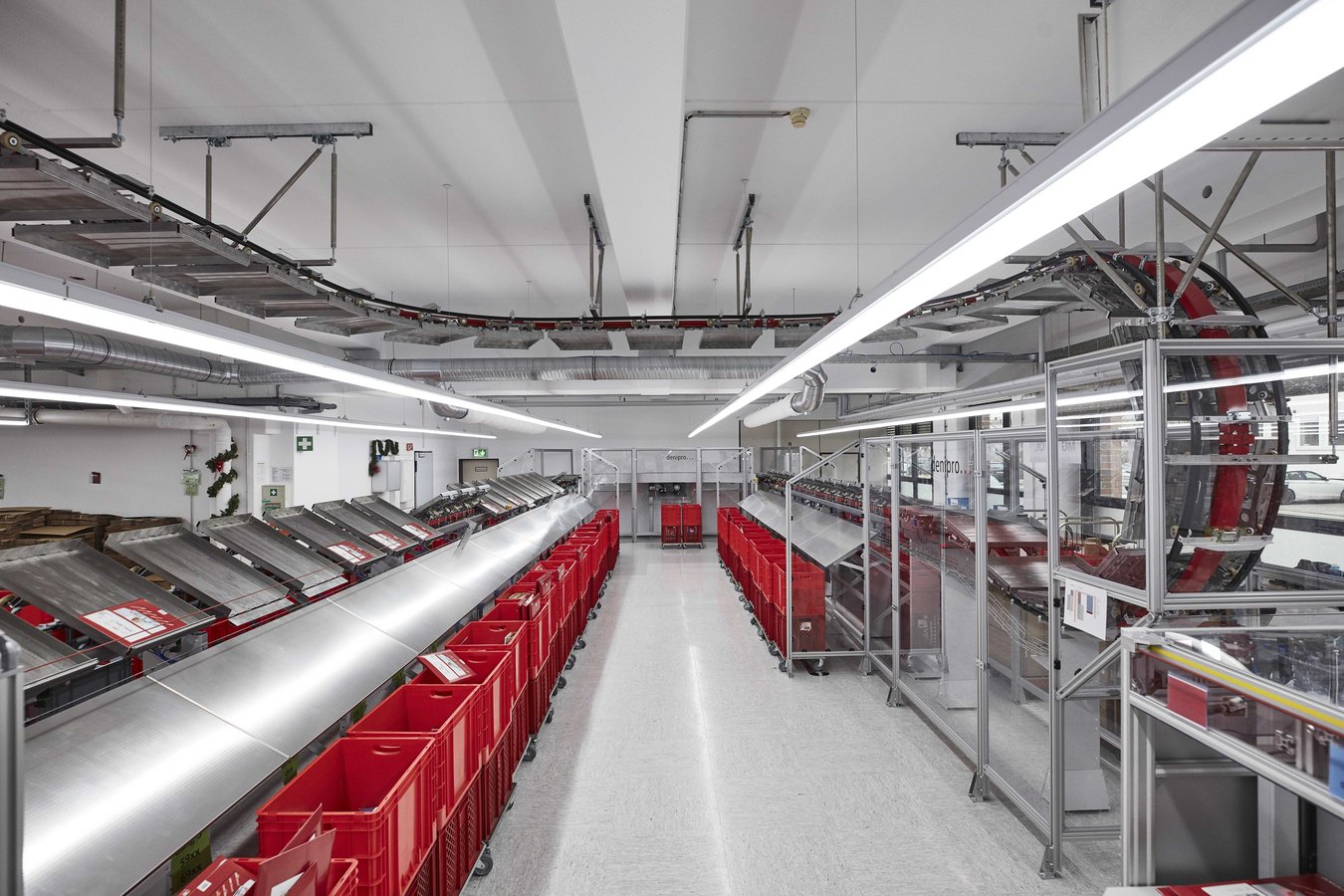
Ferag - sorting and distribution solutions
Ferag’s sorting and distribution systems can be found in a wide variety of industries. These run the gamut from food producers and online shoe sellers to parcel distributors and book wholesalers. Whether they use a Deniway, an Easychain or a Denisort system, the approach of the Swiss material handling specialist always follows the same principle: Each system is designed on the basis of the product being sorted and the individual sorting process in order to provide customers with a solution that is as efficient, optimal and reliable as possible. The engineers are able to do this even when a building’s existing layout places tight constraints on process optimisation.
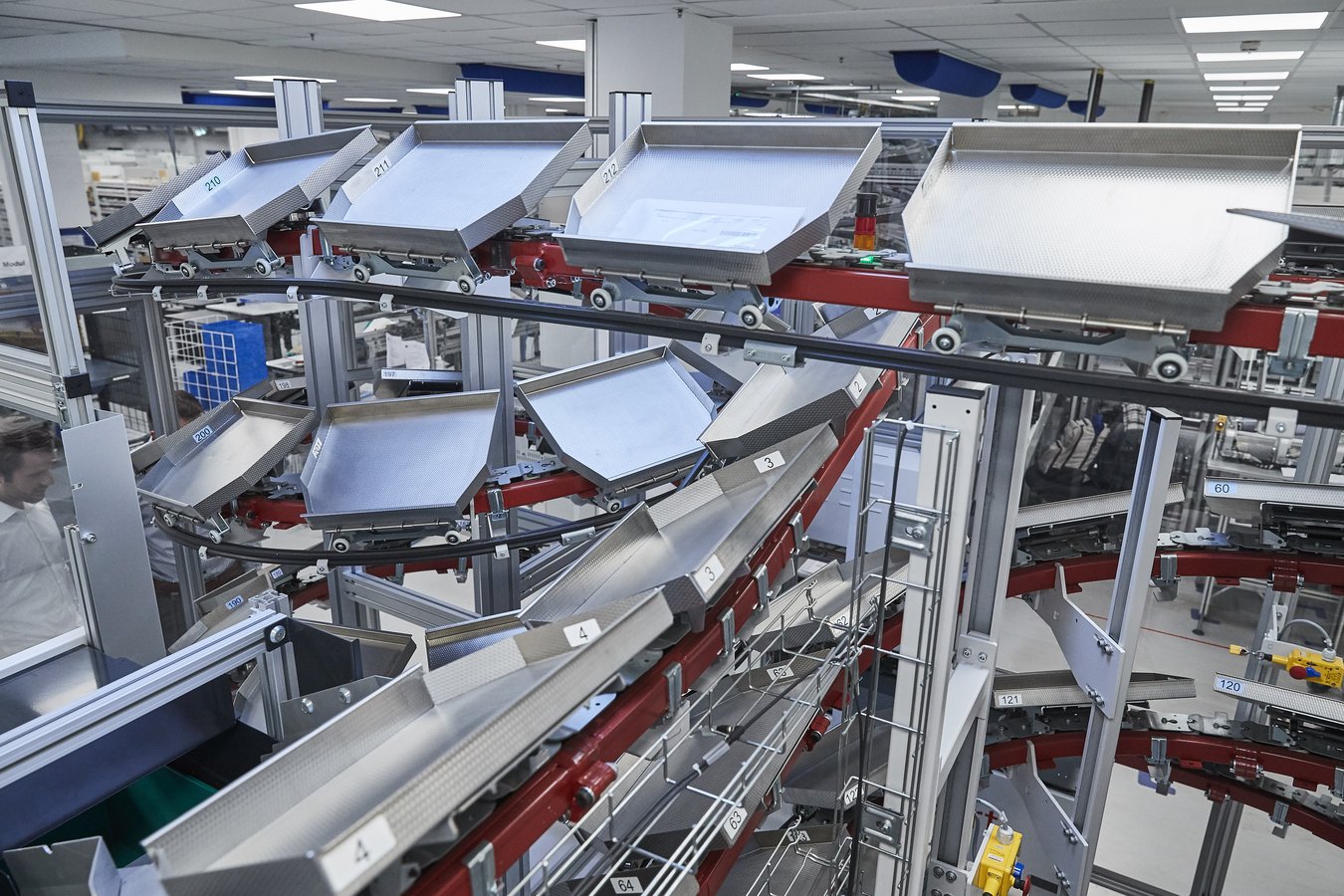
Visitors to ZEISS Vision Care in the Baden-Württemberg city of Aalen who see the company’s three-storey Denisort system quickly realise how little space is required for the sorting process, which involves as many as 35,000 shipment units daily. The entire sorting system, including the feeder from the packing machine, which has been running continuously for more than a year without stopping for maintenance, occupies just 85 square metres. It is much more compact than its predecessor, yet it has four times the capacity. Despite the tight fit, Ferag’s engineers were able to equip the system with 192 sorting destinations that can be controlled with the highest level of reliability. The Denisort trays can barely be heard as they receive one shipping envelope after another in rapid succession. These contain premium-quality spectacle lenses, which ZEISS Vision Care mostly manufactures in pairs according to opticians’ personalised prescriptions. So absolute precision is a must. This is true not only for production, but also for logistics, as ZEISS Vision customers around the world need to receive their spectacles in perfect condition as quickly as possible. The latter also requires careful handling of the goods being sorted in all respects.
The right sorting system for every purpose
Product manager Markus Bretz views the Denisort system at ZEISS as a prime example of a solution in Ferag’s “sorting conveyor solutions” product range that is optimally tailored to the customer’s needs and wishes. It shows how well Swiss sorting and distributing technology can be integrated in individual user processes “in order to take account of the growing demand for smaller order sizes, greater shipping accuracy and more frequent shipments.” In essence, “sorting” means separating, redirecting and creating individual streams of goods as they pass from the feeder lines to the dispatch lines, packing stations and palletizing processes. Areas of application and tasks differ in many respects depending on the individual case. In order to meet the full range of applications, in addition to the relatively new Denisort family, which includes the Denisort compact, the “little sister” in the family, Ferag also offers the proven Deniway (up to 50 kg of weight per linear meter) and Easychain (up to 20 kg of weight per meter; smaller curve radius than the Deniway) product lines.
.
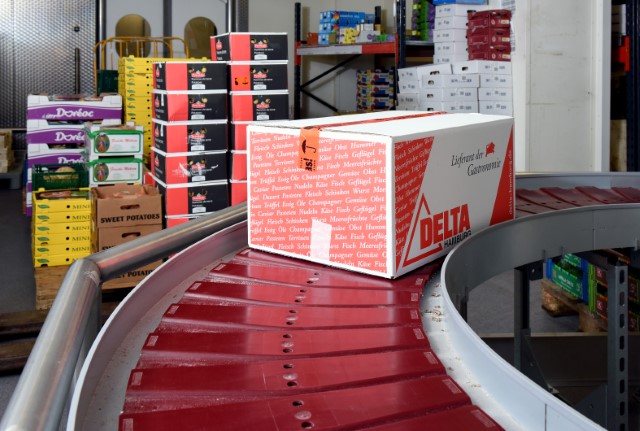
Robustness meets innovation
These three sorting and distribution systems all share the same DNA. As a result, they are highly robust and not subject to a substantial amount of wear and tear. The Denisort, Deniway and Easychain all boast chain technology, forming a closed circulator, which Ferag uses to avoid unnecessary transitions and interruptions. And they also feature a number of innovative details. For example, the Swiss material handling specialist uses patented roll-based elements it developed in-house that employ axle-free, cylindrical elements to remove loads by rolling them. This results in ten times less resistance compared with sliding conveyor technology. The result is greater sustainability: The products require far fewer drives and this conserves energy. As a result, Ferag customers get technology that is extremely durable and reliable as well as systems that are very quiet, have greater energy efficiency and function with almost no maintenance.
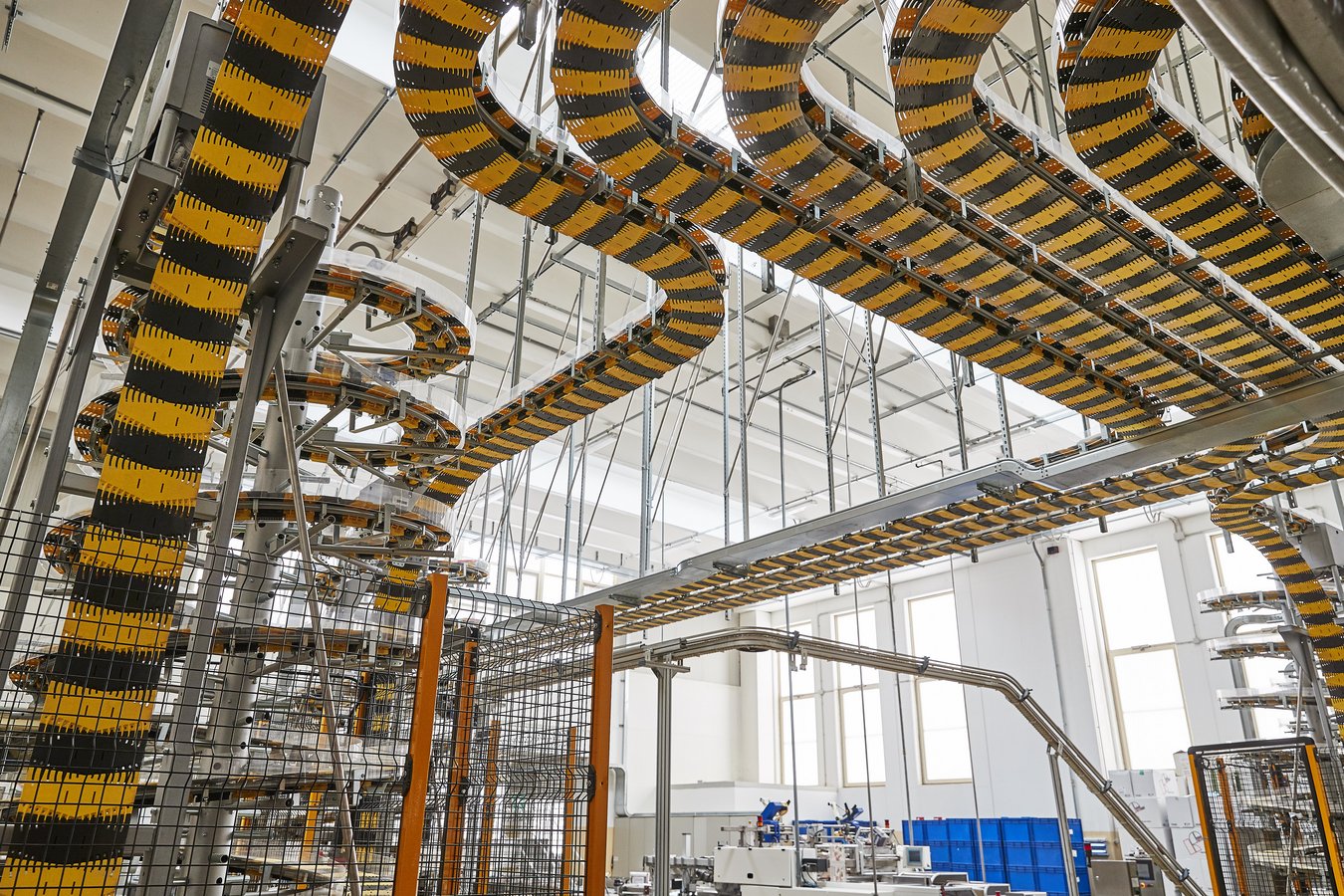
Compact system layouts
The main Denisort feature is the tilting sorting tray found on either side of the machine and available in various sizes. The innovative tilting tray sorter combines conveying, order picking and sorting in a seamless system. As with Deniway and Easychain, the layout can be designed individually to include several levels – for example, by incorporating a spiral. The case study involving ZEISS Vision in Aalen shows that the multi-level approach enables a very compact system layout. The same factor was the decisive criterion that led photo service provider CEWE in Oldenburg, where the current hall could not be expanded for environmental reasons, to choose Ferag. At 60 square meters, the Denisort system installed there needed even less space than its counterpart in Aalen.
Flexibility is the clincher
The two Denisort case studies show very clearly the extent to which substantially lower running costs can improve efficiency, throughput and availability. The seamless modular system provides long-term protection for the customer’s investment. It not only allows for versatile system layouts, it is also open to scaling. For example, the tilting tray sorter provides retail users with a high degree of flexibility in terms of future expansions of their product range. Take Hungarian Ferag customer Shoebox, which currently mainly sells shoes, but without any modifications to its hardware could add other items, such as T-shirts, belts and clothing to go with its shoes, to the Denisort line it put into operation in Budapest a few weeks ago. Moreover, depending on the company’s needs the topologies could be modified and extended with relatively little effort. A move from one location to another would also be easy to carry out. This is demonstrated by a Deniway that was originally installed in a landmark-protected section of the old Hamburg Schlachthof (slaughterhouse): Ferag customer Delta Fleisch recently took this system with it to its new production and logistics location in Norderstedt. Once the system was in the new location, says Bretz, the company, Germany’s leading supplier of hotels and restaurants, was able to completely rebuild the conveyor section on its own. To do so, the company only needed to order a few additional components from Ferag, which, as the product manager notes, is in principle always possible.
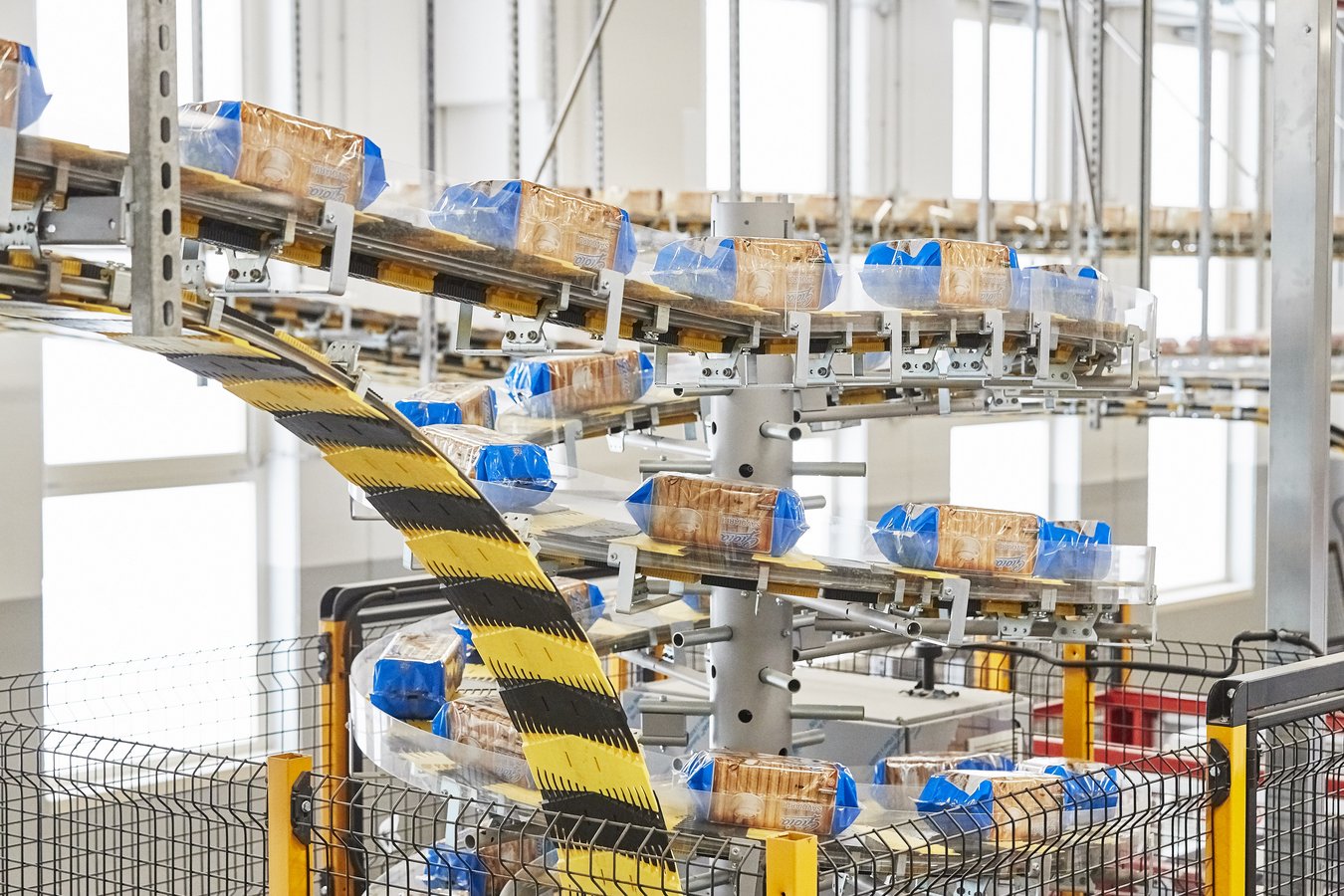
Vertical sorter from standard modules
The Denisort compact vertical sorter, which can be constructed using standard modules, has been designed for quick assembly and dismantling. This makes things easier for users when they need to change locations quickly. With a maximum load of 12 kg, this space-saving sorter has a sorting capacity of 10,080 trays per hour. It is therefore ideal for customers in the e-commerce sector and for CEP service providers who need to bridge throughput increases during peak times or who are looking for a flexible and easily scalable supplement to ramp up their base equipment.
Conclusion: each system has its merits
The modern Denisort system satisfies with a performance of up to 10,000 trays per hour. Ideal for Ferag customers who work with a number of smaller products (maximum tray size of 650 x 450 mm) and need more than 20 sorting destinations. The strengths of Deniway and Easychain, which sort with the help of pushers, lie in their ability to bridge longer distances. In the case of Italian biscuit maker Forno Bonomi, where Easychain lines combine the first and second packaging areas, this distance is several hundred meters. According to Bretz, the two closely related distribution systems are unbeatable in one respect: “In our view, they are one of the most efficient interfaces between upstream production and the palletizer currently available on the market.”
